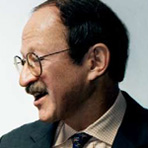Specialty
Harold Varmus
Genomics & Cancer Research
Harold Varmus, M.D., co-recipient of the 1989 Nobel Prize for studies of the genetic basis of cancer, was nominated by President Obama as Director of the National Cancer Institute on May 17, 2010. He began his tenure as NCI Director on July 12, 2010. He previously served as President and Chief Executive Officer of Memorial Sloan-Kettering Cancer Center (MSKCC) and as Director of the National Institutes of Health (NIH).
Self Exam
Biography
Much of Varmus’ scientific work was conducted during 23 years as a faculty member at the University of California, San Francisco, Medical School, where he and Dr. J. Michael Bishop and their co-workers demonstrated the cellular origins of the oncogene of a chicken retrovirus. This discovery led to the isolation of many cellular genes that normally control growth and development and are frequently mutated in human cancer. For this work, Bishop and Varmus received many awards, including the 1989 Nobel Prize for Physiology or Medicine. Varmus is also widely recognized for his studies of the replication cycles of retroviruses and hepatitis B viruses, the functions of genes implicated in cancer, and the development of mouse models of human cancer (the focus of much of the work in his laboratory at MSKCC).
In 1993, Varmus was named by President Clinton to serve as the Director of NIH, a position he held until the end of 1999. During his tenure at NIH, he initiated many changes in the conduct of intramural and extramural research programs; recruited new leaders for most of the important positions at NIH; planned three major buildings on the NIH campus, including the Mark O. Hatfield Clinical Research Center ; and helped to initiate the five-year doubling of the NIH budget.
At MSKCC, Varmus emphasized opportunities to harness advances in the biological sciences to improve the care of patients with cancer. Under his leadership, the scientific programs were reorganized and enlarged; a new research building, the Mortimer B. Zuckerman Research Center, was constructed; and new graduate training programs were established in chemical biology and computational biology (as part of a new Tri-Institutional Research Program with Rockefeller University and Weill-Cornell Medical College) and in cancer biology (through MSKCC’s first degree-awarding program in the Louis V. Gerstner, Jr. Graduate School of Biomedical Sciences).
In addition, he oversaw the construction of new clinical facilities (for pediatrics, pathology, urology, and surgery) and new centers for breast cancer treatment and imaging (the Evelyn H. Lauder Breast Center and the MSKCC Imaging Center); the founding of a hospital-based program in translational research (the Human Oncology and Pathogenesis Program); and the development of the Tri-Institutional Stem Cell Initiative and the Starr Cancer Consortium, involving five research institutions. To ensure that MSKCC was promoting high-quality cancer care for all citizens of New York and equal opportunities for its employees, he helped to found and oversee a new cancer clinic in central Harlem (the Ralph Lauren Center for Cancer Care and Prevention) and new programs for diversity and gender equity (the Office of Diversity Programs in Clinical Care, Research, and Training and the Women Faculty Affairs Program).
Varmus has authored over 300 scientific papers and five books, including an introduction to the genetic basis of cancer for a general audience and a memoir, The Art and Politics of Science, published in 2009. He has been an advisor to the Federal government, pharmaceutical and biotechnology firms, and many academic institutions, and was appointed by President Barack Obama as co-chair of the President’s Council of Advisors on Science and Technology (PCAST). He served on the World Health Organization’s Commission on Macroeconomics and Health from 2000 to 2002; is a co-founder and Chairman of the Board of Directors of the Public Library of Science, a publisher of open-access journals in the biomedical sciences; chaired the Scientific Board of the Grand Challenges in Global Health at the Bill and Melinda Gates Foundation from 2003 to 2008 and now chairs the Foundation’s Global Health Advisory Committee; and is involved in several initiatives to promote science in developing countries, including the Global Science Corps, through the Science Initiatives Group. He was also a member of the Funding Committee of the Empire State Stem Cell Board and serves as co-chair of the Institute of Medicine’s committee on “The U.S. Commitment to Global Health.” He has been a member of the U.S. National Academy of Sciences since 1984 and of the Institute of Medicine since 1991, and has received the National Medal of Science, the Vannevar Bush Award, and several honorary degrees and other prizes, in addition to the Nobel Prize.
A native of Freeport, Long Island, Varmus is the son of Dr. Frank Varmus, a general practitioner, and Beatrice Varmus, a psychiatric social worker. After graduating from Freeport High School, he majored in English literature at Amherst College and earned a master’s degree in English at Harvard University. He is a graduate of Columbia University’s College of Physicians and Surgeons, worked as a medical student in a hospital in India, and served on the medical house staff at Columbia-Presbyterian Medical Center. He began his scientific training as a Public Health Service officer at NIH, where he studied bacterial gene expression with Dr. Ira Pastan, and then trained as a post-doctoral fellow with Dr. Bishop at the University of California, San Francisco.
He is married to Constance Casey, a journalist and gardener, and has two sons, Jacob and Christopher.
